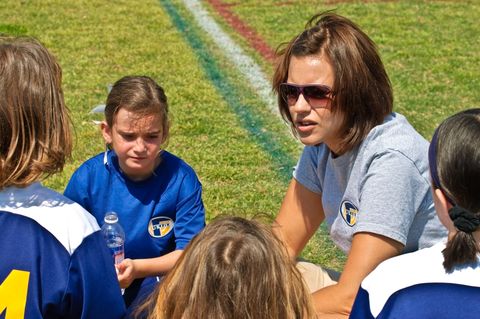Sports professionals, such as AOC president John Coates, advocate the introduction of compulsory sport (excluding PE lessons) in schools, claiming that the lack of emphasis on sport in the curriculum contributed to the disappointing performance of Australian athletes in the 2012 Olympics.
However making School Sport compulsory is not about creating great athletes. It’s about making sport accessible to, and enjoyed by all students. Just because a student is not good at sport does not mean that s/he should not play. Unfortunately the cult of having many professional sports players in Australia can lead to a nation of sport watchers rather than sport players. It is a double edged sword. It’s up to our education system to teach all students to play sports, in the same way we teach them the academic curriculum. We don’t give students the option of dropping out of academic studies simply because they are not good at it.
Mandatory participation in at least one sport is the norm for some schools, such as The Scot’s College and The King’s School in Sydney. The advantage of making Team Sport compulsory is that everyone has to play. There are teams suited to all abilities. Less gifted students are not discouraged by having to compete with more talented students. They succeed at their own level. In Schools in which School team sports are compulsory, students do not have an easy excuse to give up. This avoids students dropping out of team sport because they think they do not measure up, as frequently happens. It’s unfortunate when this happens because these students do not gain the many benefits of playing a team sport.
Students benefit from involvement in physical activities regardless of whether they have the aptitude or inclination for it.
The Benefits
- Exercising regularly increases an individual’s fitness level, lowering the risk of medical conditions such as cardiovascular disease and obesity. Obesity is on the rise among children and adults – according to a 2016 Courier Mail report, 27% of Queensland children were obese.
- People are more likely to get into the habit of playing sport and exercising if you start young, and build those neurone connections that turn repeated experiences into a lifelong fitness habit.
- Playing sport develops transferable competencies such as teamwork, a sense of fair play and responsibility, self-esteem, organisational, time management, and leadership skills.
- Physical activity and sports teach the value of discipline, commitment, and hard work. Individual progress can be measured and improved upon through training.
- Positive, non-judgemental competition encourages respect of others’ abilities, strengths, and weaknesses.
- Compulsory school sport forces you to re-evaluate the misconception that you have to be good at something to enjoy it. This is not necessarily true, particularly in a positive environment where the emphasis is not on victory at all costs, but rather on having fun and improving your skills.
- Parents and students may be concerned that less able players risk being bullied for their lack of skill. Coaches need to reinforce that bullying is unacceptable and that every student’s effort and contribution is valued, regardless of skill.
- In team sports, if students are matched with players of similar ability, they will feel more confident to extend their sports knowledge and skills.
- For those who don’t have sporting ability and who are intimidated by comparing themselves to others, the emphasis can be on achieving personal bests rather than victory over opponents.
- Sport helps students develop resilience and coping strategies to face failure and navigate competitive situations which are part of life.
- Although students may be introduced to different sports or physical activities in PE class, these lessons are too short for students to discover whether they enjoy them or are good at them. If students choose one sport per term within a compulsory sports programme, and then switch to another one, they will be exposed to a range of activities during their time at school. This broadens their learning experience.
- Knowledge of a range of sports can help students connect with others.
- Sport creates opportunities for students to interact with their peers and form strong friendships while pursuing common goals.
- Compulsory sport reinforces the idea that different types of knowledge and ability are valued, apart from academic ability.
- Studies suggest that involvement in sport improves concentration levels and academic achievement. A study of 9700 students aged 14 to 18 conducted by researchers from Pennsylvania State University and the University of South Carolina found that adolescents who belong to school sports clubs, rather than drama or debating societies, are more likely to complete their education and go to university.
- School Sport encourages teacher-student bonding outside the classroom.
- Compulsory participation can make playing sport less expensive for students, as some schools provide equipment, playing spaces, and transport to and from venues at subsidised prices.
- Gifted players don’t have to carry the entire responsibility of a match on their shoulders in competitions, because even if their peers are less talented, the less able students can still support them and contribute to the team’s performance.
Well managed compulsory team sport is a beneficial to the overwhelming number of students, There needs to be elements of choice and a positive approach. Students should be free to discover a sport they enjoy in an atmosphere which encourages them to reach their personal best and respect each other, regardless of skill levels. Sport should be accessible to all students, not only to those with natural sporting ability. Making sport compulsory in Schools removes the hidden inaccessibility.
Sources
“Do Australian schools need more sport?” The Good Schools Guide. Good Education Group. 2018.
“Should school sport be compulsory?” The Scots College Blog. 17 October, 2017.
Jenkin, Matthew. “Does competitive sport in school do more harm than good?” The Guardian. 29 January, 2015. (accessed 23 April, 2018). <https://www.theguardian.com/teacher-network/2015/jan/29/competitive-school-sport-harm>.
Lang, Kylie. “Sport should be compulsory in schools.” The Daily Telegraph. 15 April, 2016.



